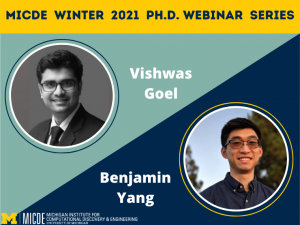Presented By: Michigan Institute for Computational Discovery and Engineering
Vishwas Goel (Materials Science & Engineering) and Benjamin Yang (Biomedical Engineering)
Ph.D. in Scientific Computing Student Seminar Series

VISHWAS GOEL: Vishwas is a third year Ph.D. student in the Thornton group, Department of Materials Science and Engineering. His research involves the simulations of the continuum level or microstructure level electrochemical dynamics of energy conversion/storage devices such as batteries, fuel cells, etc.
"SIMULATION OF EIS IN SOFC CATHODES USING SMOOTHED BOUNDARY METHOD": Electrochemical impedance spectroscopy is the most commonly used technique for the in-situ characterization of solid oxide fuel cells (SOFC). In this presentation, I will discuss about a method for simulating the impedance behavior of a mixed conducting SOFC cathode with an experimentally determined microstructure. I will also share the key insights that we generated through our work.
BENJAMIN YANG: Ben is a 4th year PhD student in Dr. Carlos Aguilar’s Lab. His research explores the molecular mechanisms that regulate cellular fate plasticity using microfluidics, cell-cell fusion, and single-cell sequencing techniques.
"DECONSTRUCTING METASTATIC REGULATORS USING INTERSPECIES HETEROKARYONS": Tumor metastasis, the spread of cancer cells to sites beyond the primary tumor, is the primary contributor to morbidity in cancer patients. While each step of the metastatic cascade is well characterized, the molecular mechanisms responsible for initiating the cascade remain unclear, inhibiting the efficacy of therapeutic modalities. We revisit a century-old hypothesis that changes in metastatic potential are conferred to tumor cells through fusion with neighboring stromal cells by fusing human breast cancer cells with brain-resident mouse microglia and astrocytes. Our main objectives are to assess how aberrant fusion between malignant cells and stromal cells overrides transcriptional safeguards against metastatic progression and to explore how fusion modifies the mechanical phenotype of tumor hybrids. Achieving these goals will advance our understanding of the biological significance of fusion events in metastasis and delineate markers that can serve as therapeutic targets.
Register to receive Zoom information: https://myumi.ch/dOA75
"SIMULATION OF EIS IN SOFC CATHODES USING SMOOTHED BOUNDARY METHOD": Electrochemical impedance spectroscopy is the most commonly used technique for the in-situ characterization of solid oxide fuel cells (SOFC). In this presentation, I will discuss about a method for simulating the impedance behavior of a mixed conducting SOFC cathode with an experimentally determined microstructure. I will also share the key insights that we generated through our work.
BENJAMIN YANG: Ben is a 4th year PhD student in Dr. Carlos Aguilar’s Lab. His research explores the molecular mechanisms that regulate cellular fate plasticity using microfluidics, cell-cell fusion, and single-cell sequencing techniques.
"DECONSTRUCTING METASTATIC REGULATORS USING INTERSPECIES HETEROKARYONS": Tumor metastasis, the spread of cancer cells to sites beyond the primary tumor, is the primary contributor to morbidity in cancer patients. While each step of the metastatic cascade is well characterized, the molecular mechanisms responsible for initiating the cascade remain unclear, inhibiting the efficacy of therapeutic modalities. We revisit a century-old hypothesis that changes in metastatic potential are conferred to tumor cells through fusion with neighboring stromal cells by fusing human breast cancer cells with brain-resident mouse microglia and astrocytes. Our main objectives are to assess how aberrant fusion between malignant cells and stromal cells overrides transcriptional safeguards against metastatic progression and to explore how fusion modifies the mechanical phenotype of tumor hybrids. Achieving these goals will advance our understanding of the biological significance of fusion events in metastasis and delineate markers that can serve as therapeutic targets.
Register to receive Zoom information: https://myumi.ch/dOA75